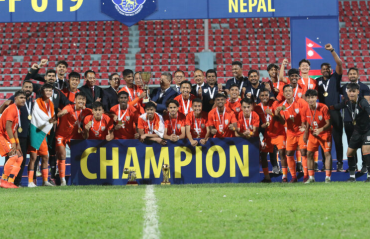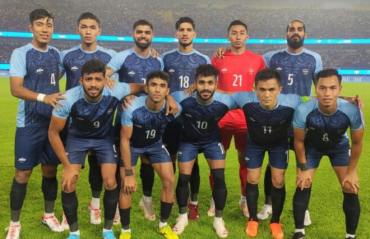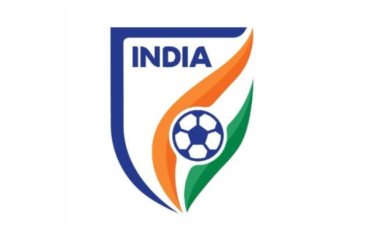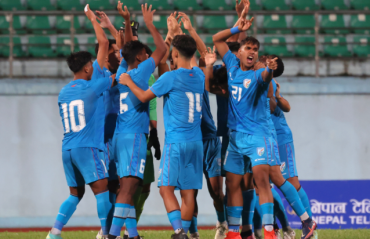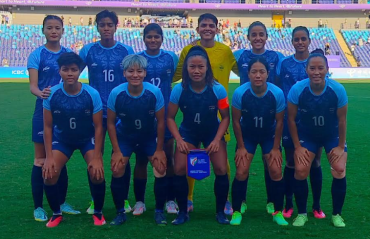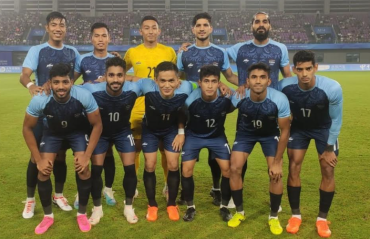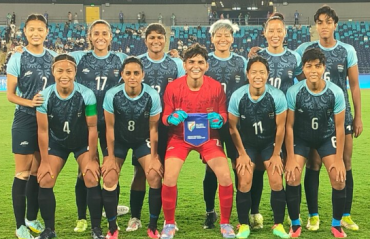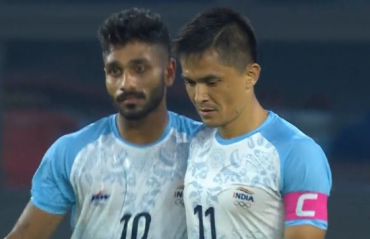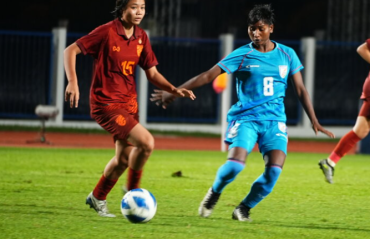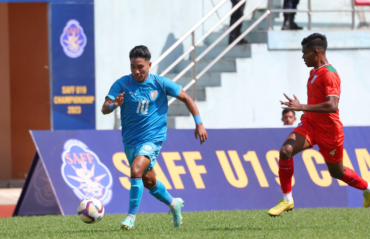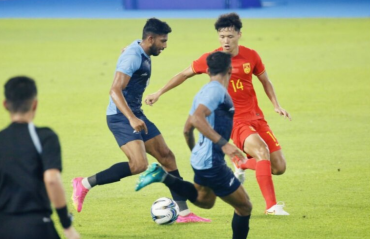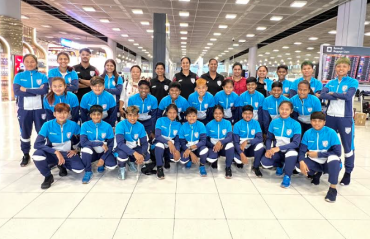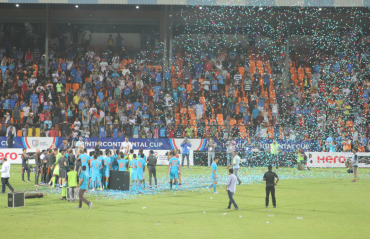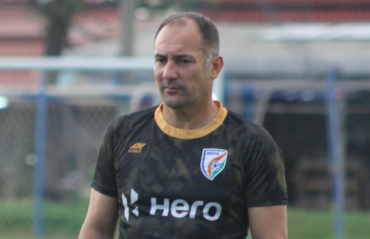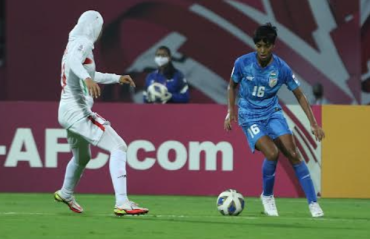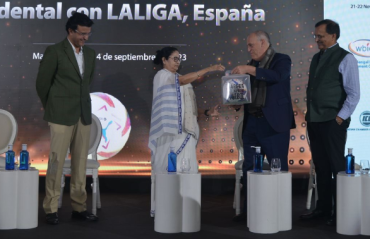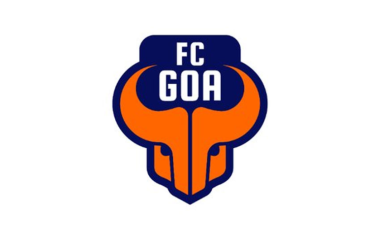Review: From Delhi to the Den by Stephen Constantine -- a nomad's adventures in world football
- By Chiranjit Ojha

- August 11, 2017
WHENEVER I THINK of Stephen Constantine's first tenure with the Indian national team, one image inevitably jumps out above all else.
It was a newspaper cartoon published days after India's mammoth 7-0 loss to Japan in the World Cup Qualifiers. It depicted Constantine wearing a garland of dried cowdung and had a short poem underneath. Roughly translated from Bengali, the first four lines went like this,
"Do re mi fa sol la ti,
Seven goals by Japanese.
India says, for heaven's sake,
Turns out Constantine's a snake!"
The cartoon perfectly sums up how the media, and the fans in general, view and evaluate football coaches. In a country like India where it's rare for players to land a contract lasting longer than one season and clubs are used to firing coaches weeks into the job if they fail to deliver immediate results, being the national team coach means wearing a gigantic target sign on one's back. Especially when it's a foreign coach; everyone assumes by default that he is a temporary presence. To create an impression of success, a coach has to deliver good results again and again for a period of time long enough to hammer home the memory of it, but it can all be ruined by one little scoreline.
The LG Cup of 2002 is mostly forgotten, but that fatal night of 2004 remains in every fan's psyche. Whatever little sympathy we have is reserved for the players whose struggles we see on the pitch. The coach's efforts, however, happen behind the scenes, hidden from public view. So he gets defined just by the final score.
Which is why Stephen Constantine's autobiography "From Delhi to the Den", written in collaboration with Owen Amos, is such a rare opportunity especially for Indian fans to look into the last decade and a half of football in their country from a perspective they are rarely granted, and see the human side of someone occupying a position they always view with skeptical eyes.
The book does a great job of capturing Constantine's growth and evolution from a football-obsessed child to an accomplished international manager. The writing of Owen Amos is fluid and folksy and it manages to capture the hard-hitting frankness that Constantine's personality embodies. The London-born Arsenal fan is an enviable subject for a biography. His story is that of somebody who is a nomad and a family man at the same time, and whose unrelenting passion for football takes him from the streets of Highbury to war-torn Cyprus, from Latino bars in New York to the "dreary" landscapes of North Korea, from entering a locked up apartment through the window to being a guest of honour at the royal palace of Nepal. It's a classic struggle-to-the-top story that football has given us so many of, yet fresh in its unusual turns and a spirit of global adventure.
Born to a Cypriot father and English mother, Constantine's childhood saw plenty of moving around. He grew up first as a regular kid playing loads of football (he got trials at a couple of major clubs) then as an immigrant kid in his father's country trying to learn a new language and adjusting to life in a foreign country. While he was growing up, Greek invaded Cyprus and his family had to flee to a UN refugee centre to avoid being bombed. Afterwards, his mother passed, and soon an argument with his father led to him walking out of home as a teenager. Throughout these early years where nothing was certain and life could change on him at the blink of an eye, the one thing he always found in common was football, and his dogged determination to pursue it as a player set the tone for the life that he was about to have.
After playing at a couple of lower league clubs in Cyprus, a young Constantine ended up in the USA, where other than selling flowers and cutting diamonds he was running around getting every game he could, including at a professional team for a while. But soon afterwards, an injury ended his playing days. And it's here, at what must be one of the lowest points in his life, the book really takes off and we see the Constantine we know today begin to take shape.
We follow him meticulously acquiring his coaching credentials and trying to improve himself in a line of work notoriously difficult for anyone without notable credentials as a player. As he makes a transition from being a single wanderer to a family man, the rootless life of a football coach and the dearth of opportunities makes life harder to navigate, but he persists.
As he works his way up from a Cypriot lower league club to reputed national teams, he becomes a unique POV character for global football: corruption (financial, refereeing-related, age-fudging etc), politics, bureaucracy social upheavals, war, fan madness, club vs country, professionalism in various forms and stages, and the strange intersection of all this that happens with the beautiful game.
It's a strange amalgamation of a biography, a travelogue, a professional's take on some unique times and places in the history of football and somewhere down the line the protagonist's journey merges into the journey of a footballing entity - a nation, a club or a society - as it battles problems of its own.
Some of the most beautiful parts of the book are set in Nepal. There's a sequence when Constantine puts on a traditional Nepali dress and walks around the pitch of the Dasarth Rangasala Stadium to rile up the packed house and his players. He then meets the king's family and drives through Maoist barricades in an armoured army vehicle to retrieve his family who would otherwise get stuck at the airport. Then there's the engaging moment when he meets Arsene Wenger, the Arsenal manager. We get glimpses of the football cultures of Sudan, Malawi and Rwanda but of course, for an Indian football fan, the most intriguiing parts would be his time as the Indian national team coach; and the book devotes 3 whole chapters to this.
Without going too much into spoiler territory, let's just say that for long-time Indian football fans, this book delivers a stark realization of how far we have come in just a few years. Constantine describes his very first national camp; held in Jamshedpur where players were given bunk beds at the stadium hostel, and the condition of fitness regimens and diet were poor. Compare that to today's national camps with 5-star hotels and state-of-the-art equipment with a dedicated sports scientist and a dietitian on board (many of these improvements he fought to introduce) and it seems like a sea change.
There's also the coach's perspective on the players. His first meeting with Baichung Bhutia. His relationship with Abhishek Yadav, who apart from playing under him went on to become his chief of scouting. There's memorable incidents involving Vijayan, Sunil Chhetri and other recognizable names in Indian football. And there are those who he is not very kind towards; Romeo Fernandes and Mandar Rao Dessai being two such names. The way the book delivers his perspective matches a lot with the way he puts forth his perspective in press interactions and interviews. There's not much room for sugarcoating.
And then there's his dealings with the Indian football brass. The juicy stuff. ISL features strongly, and his view of the tournament and the effects it has had on his team are pretty honest. At one point he refers to it as the "circus... rolling into town" but he is not blind to the positives it has brought in either. There are detailed accounts of the tiffs he had with high profile coaches of ISL franchises regarding the release of players, and he explicitly spells out the negative impact ISL had on players' fitness during national duty, and his belief that in India the ISL gets a better treatment from AIFF than the national team. He notes the effect upcoming ISL medicals had on the effort the players put in during the infamous defeat to Guam away from home, and rues the lack of preparation the Blue Tigers got ahead of a very difficult away trip during the World Cup Qualifiers which coincided with the ISL which does not observe any international breaks. That's not to say he spares I-League and it clubs either; India's defeat to Turkmenistan in March 2016 came just before the Kolkata Derby, and he believes many players may have been told to go easy on that account.
In general, Constantine's view of club football in India is that of a typical national team manager. He does not like the fact that clubs - especially those in ISL - can influence the schedule of national team camps. He complains that the fitness training players receive at clubs is far inferior to the national camp. But at the same time he acknowledges the way ISL has promoted football in India, and believes a parallel ISL and I-League can provide a better platform for talent to come through (Here he ignores the negative effect this arrangement, bereft of promotion-relegation and a unified league pyramid, can have on independent clubs that are not under the IMG-Reliance umbrella; but that's not for the national team gaffer to worry about).
But the most important part of the book, arguably, is his account of efforts made to introduce young talent in the team; something he has done during both his tenures with the national team. It's not an easy route to take for a coach; as mentioned above, the national team coach always walks on thin ice, and trying out young players means a risk of getting the sack due to initial bad results. Constantine's initial losses generated a firestorm, and his delight at the turnaround that started with a win against Guam, through the SAFF Championship, defeating Puerto Rico and continues into the Asian qualifiers is palpable in the writing. It takes nothing less than a string of consistent good results for a football manager to earn real respect, and by producing the largest winning streak in the Indian national team's histroy, he has hammered home a recognition for his efforts. Those humbling memories of 0-7 defeats have been replaced with a situation where now fans turn up at a national team's game expecting a win. Just a couple of years ago, that wasn't the case, even if we were playing Nepal or Bhutan. Now, even if we are facing heavyweights like Iran or Oman, we can look forward to a hard fight. He could have walked a safer, more traditional route as the India coach but that would be out of character for him, and that goodness for that.
The one takeaway that would slightly trouble an Indian football fan, though, is his obvious longing for a job in England. This is not something to hold against Constantine. He is, after all, from England and grew up on English football. His account of the short stint with Millwall as a first team coach makes it quite clear how much a job in the Football League means to him. And frankly, any coach working in Indian football today, whether an Indian or a foreigner, would take a good position at an English club in a heartbeat.
Towards the end of the book Constantine reveals how he turned down a job at League One club Port Vale, but makes it clear he won't mind leaving if the right opportunity shows up. While it's good to know that he rates the Indian national team job above Port Vale, but it leaves the reader with the reminder that despite the torrent of emotions surrounding football, at the end a job in the sport has to be considered with stone-cold professionalism. And while the Indian national team has been a pretty interesting and potentially career-defining gig for Constantine, it's neither the beginning nor the end for his coaching career.
There's a cartoon that Constantine mentions in the book - not the one described at the beginning of this article, but one from Rwandan media - of him staring at a bag full of Indian rupees. The fans and media in Rwanda undoubtedly felt abandoned when he decided to leave for the Indian job, and he may decide to leave India and it won't be nice to see him go, but this books makes his case in advance: money is a huge factor (he would know) but it won't be the beginning and end of it. He didn't come to India for the money alone, and he won't leave for just the dough.
Constantine has been a football coach for almost three decades, and this book is an apt sum-up of his journey till now. There's every possibility that three decades from now or much sooner, there will be a sequel to this book that includes a new set of locations with teams that are way more high profile. Whether or not India will take up a good few chapters in that book too, remains to be seen.
From Delhi to the Den: The Story of Football's Most Travelled Coach
by Stephen Constantine, with Owen Amos
deCoubertin Books
Available from Amazon (Hardcover ₹ 821.00, Kindle E-book ₹ 470.82)
Get the latest in the world of Sports, Teams, and Players! Free Delivery to your Inbox.









